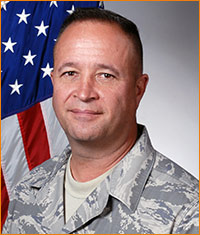2008 Airman of the Year
winner

Chief Master Sgt. Stephen Page
RANDOLPH AIR FORCE BASE, TEXAS - Annette Slaydon first met Command Chief Master Sgt. Stephen Page on Halloween night 2007, a week after her husband lost an arm and was blinded by a roadside bomb in Iraq.
Staff Sgt. Matthew Slaydon lay unconscious on a gurney in the belly of a C-17, his arm amputated and his face shattered, lacerated and grossly swollen.
"The plane landed and the engines were not even off, and up walks ... Chief Page in his uniform at 1 o'clock in the morning," Annette recalls. "He had never met me before ... and he just came up and he threw his arms around me, and he said, 'You're in Air Force country now. I got you. Everything's going to be OK.' ... That was the first time I really felt that things would probably be OK."
Matt doesn't remember that first meeting, but he says he will never forget a visit with Page about a month later:
"One day ... chief came to see me [in the hospital] and before he left he came over and put his arm around me, and he leaned down in my ear and he told me, 'We're going to get through this. ... If I have to carry you on my back, I will.' And he hugged me and left. He has been there for us ever since. And I know if he had to throw me on his back to get me over a hump, he would do that."
It's an extraordinary story of selflessness and compassion, but it is hardly unique.
More than a few people at Randolph Air Force Base, Texas, have similar stories about Page, the command chief for the 12th Flying Training Wing. The 48-year-old has earned a sterling reputation on base and beyond for helping wounded troops and ordinary folks alike, and for his leadership of his airmen.
Page, who is retiring in October, has visited hundreds of wounded troops from all the services at nearby Brooke Army Medical Center, a level of dedication he says was inspired by seeing how few patients had visitors early in the war.
"They want people to know they're human beings," Page explains. "I look them in the eye and say, 'Hey man, how's it going?' A lot of times people don't know how to speak to them ... and how to react. ... The only thing I do is just give them hope — take them to a ballgame, a concert, have a beer at the house with them.
"Anything just to let them know ... [they're] not forgotten."
Senior Airman Daniel Acosta, who also lost an arm to a roadside bomb in Iraq, says Page has been a constant presence throughout his two-year recovery.
"He's probably been the person I talk to the most, just about anything," Acosta says. "Days where you're feeling depressed, because it's tough for someone who gets wounded ... just to have somebody to talk to and be there."
Page's commander, Col. Jacqueline Van Ovost, said the chief has an uncanny ability to connect with people of all stripes.
"There are 3,600 folks here that he mentors," she says. "But he has this ability to pick out the ones that need that touch right then. ... His forte is knowing you and knowing what you need."
That human touch is evident as Page makes his rounds of Randolph. Everyone from airman first class to retired generals clamor for his attention.
"I spent several years as a first sergeant, and the one thing I realized is that your office is just a cool place to hang pictures," Page says. "Your real office is out there on the streets."
Page says he plans to keep those people skills fresh after retirement, possibly working with wounded troops through the Veterans Affairs Department. "This is the least I can do for them," he said.
